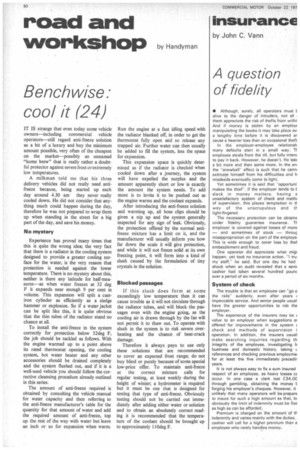insurance
Page 52

If you've noticed an error in this article please click here to report it so we can fix it.
by John C. Vann
A question of fidelity
• Although, surely, all operators must t alive to the danger of intruders, not all them appreciate the risk of thefts from withi And if money is stolen by an employc manipulating the books it may take place ov a lengthy time before it is discovered ar cause a heavier loss than an occasional theft
In the employer-employee relationsh many defaults start in a small way. 11 employee steals from the till, but fully intenc to pay it back. However, he doesn't. He tak( a bit more and then some more. In the en. the "snowballeffect is such that he canni extricate himself from his difficulties and h misdeeds eventually come to light.
Yet sometimes it is said that "opportuni makes the thief". lithe employer tends to slack in money matters, having a unsatisfactory system of check and meth( of supervision, this places temptation in tt way of the unscrupulous and th light-fingered.
The necessary protection can be obtainE under fidelity guarantee insurance. employer is covered against losses of monc — and sometimes of stock — throuc misappropriation on the part of the employe, This is wide enough to cover loss by thel embezzlement and fraud.
One operator did appreciate what mig happen, yet took no insurance action. "I tru my staff," he said. But one day he had shock when an audit revealed that a senii cashier had taken several hundred pounc over a period of six months.
System of check
The trouble is that an employee can "goo the rails" suddenly, even after years impeccable service. And senior people usual have the greater opportunities to rob the employer.
The experience of the insurers may be value to an employer when suggestions al offered for improvements in the system check and methods of supervision i operation. In addition, the insurers usuall make searching inquiries regarding th integrity of the employee, investigating h business and domestic history, taking references and checking previous employmel for at least the five immediately precedir years.
It is not always easy to fix a sum insured respect of an employee, as heavy losses CE occur. In one case a clerk lost £34,0C through gambling, obtaining the money t forging his employer's cheques. However, it unlikely that many operators will be prepare to insure for such a high amount as that, bt obviously the limit of indemnity must be fixe as high as can be afforded.
Premium is charged on the amount of if indemnity and varies mainly with the duties. cashier will call for a higher premium than a employee who rarely handles money.








































































































